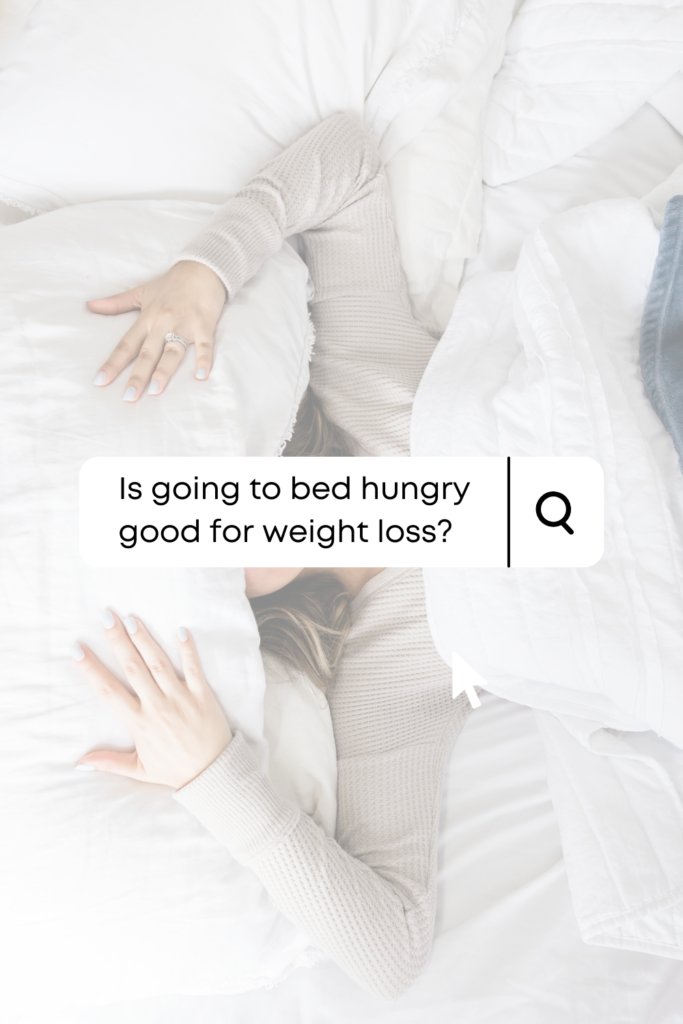True or False: Going to bed hungry is good for weight loss

My husband casually told me one day that the key to weight loss is just eating less, and going to bed hungry. And as a dietitian… I thought to myself…there is nothing that could be more wrong.

The Case for Going to Bed Hungry
Reduced Caloric Intake
One of the primary arguments for going to bed hungry is that it can help reduce your total caloric intake. Consuming fewer calories than you burn is a fundamental aspect of weight loss. By skipping a late-night snack or a big meal before bed, you’re more likely to create a calorie deficit that can lead to weight loss. That said, there’s no guarantee that you won’t up your food intake the next date to make up for it.
Improved Insulin Sensitivity
Fasting overnight can lead to better insulin sensitivity, which is crucial for weight management. Improved insulin response helps regulate blood sugar levels and reduces the risk of insulin resistance, a condition that can lead to weight gain and other health problems like diabetes and cardiovascular disease.
Keep in min that practicing a fasting schedule and going to bed hungry are two very different things.
Fat Burning
Going to bed on an empty stomach may prompt your body to burn stored fat for energy, leading to fat loss. This is similar to the principles of intermittent fasting, which involves alternating between periods of eating and fasting to promote weight loss and improve overall health.
Losing weight does not have to be a painful struggle. It takes work, but you don’t have to be miserable doing it.
Melanie Marcus MA RD
The Case Against Going to Bed Hungry
Poor Sleep Quality
Going to bed hungry can lead to poor sleep quality, which is associated with weight gain and difficulty losing weight. Lack of sleep can disrupt your body’s circadian rhythm, leading to sleep disorders like insomnia and sleep apnea. Sleep deprivation affects appetite hormones, increasing levels of the hunger hormone ghrelin and decreasing levels of leptin, the hormone responsible for feelings of fullness. The solution may be a 200 calorie bedtime snack, a combo of protein and carbohydrate to take the edge off. There’s nothing worse than not getting enough sleep!
Increased Cravings
We’ve all been there. Standing in front of the pantry, looking for something to eat. Instead of choosing nutritious food, we go for ice cream or potato chips, giving into our cravings. When your calorie intake is much lower than needed (like when you skip a meal), you can fall into a situation where your cravings get the best of you when it’s time to choose a meal. All too often junk food is more accessible and requires little to no cooking, making it an appealing option when we want to eat something – NOW.
Slowed Metabolism
Prolonged periods of hunger can slow down your metabolism, making weight loss more challenging in the long term. (Don’t worry, this doesn’t happen if you are intermittent fasting properly.) Your body may enter a state of “starvation mode,” conserving energy and burning fewer calories to protect against perceived famine conditions.
Join my next 6 week challenge!
Tired of endless diets and no results? Join the FASTer Way to Fat Loss and see real, sustainable changes in just 6 weeks!

Practical Tips for Managing Hunger Before Bed
If you’re trying to lose weight but find yourself feeling hungry before bed, here are some practical tips to help you manage your hunger and still get a good night’s sleep:
Balanced Meals
Focus on consuming balanced and filling meals throughout the day to avoid extreme feelings of hunger before bed. Include lean meats, whole grains, and plenty of fruits and vegetables at each meal. If you want to dial it in, you can work with a dietitian to set your unique calorie and nutrient needs to meet your health goals.
Protein and Fiber
Include protein and fiber in your evening meal to promote satiety and reduce the likelihood of feeling hungry later. Foods like lean meats, beans, and vegetables are excellent choices.
Healthy Snacks
Opt for a light, healthy snack if you’re genuinely hungry before bed. A small portion of nuts or Greek yogurt can satisfy your hunger without adding too many extra calories.
Stay Hydrated
Sometimes thirst can be mistaken for hunger. Aim to drink a glass of water if you feel hunger pangs. Staying hydrated is essential for maintaining energy levels and overall health.

Mindful Eating
Practice mindful eating to savor your meals and become more attuned to your body’s hunger and fullness cues. This can help manage nighttime hunger and prevent overeating.
Regular Sleep Schedule
Establish a regular sleep schedule and prioritize sleep quality to reduce the likelihood of cravings and overeating the next day. Quality sleep helps regulate appetite hormones and supports healthy weight management.
So overall, going to bed hungry may help reduce caloric intake and improve insulin sensitivity, it can also lead to poor sleep quality, increased cravings, and a slowed metabolism. The best way to achieve weight loss is through a combination of balanced meals, regular physical activity, and quality sleep. By managing your hunger before bed with healthy snacks and mindful eating, you can support your weight loss goals without compromising your sleep quality.
If you’re unsure about the best approach for your nutritional needs, consider checking out my program. We can chat through some strategies to meet your overall health goals. Here are a few other articles that may interest you:

